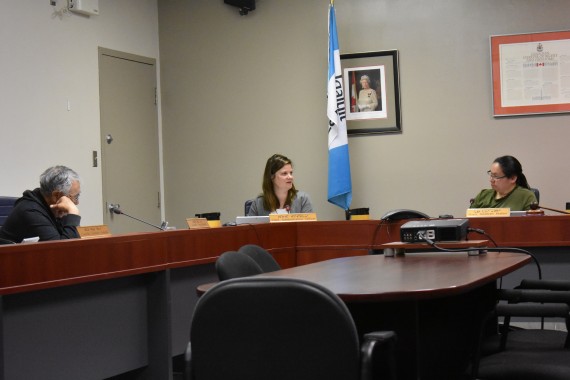City of Iqaluit agrees to boost water delivery to businesses
Move should allow Nunavut Brewing Co. to ramp up beer production

Amy Elgersma, the City of Iqaluit’s acting chief administrative officer, speaks during a council meeting on Tuesday, Aug. 14, where council agreed to an administration plan to allow businesses receive more trucked water than the existing 2,000-litres limit. (PHOTO BY COURTNEY EDGAR)
(UPDATED, AUG. 16, 11:55 a.m.)
Nunavut Brewing Co. should now be able to receive the water it needs to produce beer, following a decision by Iqaluit city council last night.
Council agreed to a plan, recommended by city administration, that would allow businesses to enter service agreements with the city to receive extra trucked water, beyond the existing 2,000-litre-per-day limit.
However, city staff caution that this plan could strain the city’s resources, see workers rack up overtime and possibly require that the city lease a new truck.
The brewery, which plans to open on Aug. 24, requires an additional 8,000 litres of water each day for beer production.
The company faced a setback in late July, when city councillors voted down a proposed overhaul of the city’s existing water and sewer bylaw that would have allowed private water delivery to businesses with greater needs.
The bylaw’s defeat was largely due to concerns over an amendment that some councillors fear could open the door to the privatization of water delivery in the city.
Following a public consultation on the issue held last week, where some residents expressed concern about businesses selling the city’s natural resources for a profit, the city decided to put off the overhaul of its water and sewage bylaw, which was created in 1989.
Deputy mayor Romeyn Stevenson seconded the motion to increase how much water could be delivered to businesses, but he expressed disappointment in the decision to delay rewriting the water and sewer bylaw.
The plan, he said, “is to push the city’s staff, push the city’s equipment, push the city’s infrastructure to the limit as much as it is possibly capable, because this council was too afraid to do the logical and realistic thing and re-write a 30-year-old bylaw to come up with a sustainable solution.”
“I’m embarrassed a little bit that I am going to vote in favour of this motion but I have to,” Stevenson said. “It is the only way I can see that we are going to come up with a solution to the situation that we put ourselves in. But don’t get me wrong—we are making a mistake by pushing the city’s infrastructure, pushing the city staff and the city equipment when we should have re-written the bylaw.”
Amy Elgersma, the city’s acting chief administrative officer, presented council with five options, based on feedback from last week’s public consultation.
One of the options would have allowed contractors to set up service agreements to provide trucked water and sewage hauling. This would be difficult to enforce, Elgersma said.
Another option would be to try once more to amend the existing water and sewage bylaw, although this would take a lot of time.
Coun. Kyle Sheppard asked Elgersma how the city would cope with the strain of providing additional water and sewage services. “There will need to be operational changes,” Elgersma said. “We will need to have trucks on the road seven days a week.”
Elgersma also said the city would need to create a recruitment and training program for employees who operate the trucks.
“Based on the feedback provided from the public consultation, this seems like the best-case scenario,” Sheppard said.
“People have requested that the city maintain control of the resources, control of the service and have indicated a desire for the city to provide these services for our businesses.”
Councillors Noah Papatsie and Joanasie Akumalik voted against the motion.
Corrections: An earlier version of the story said Amy Elgersma told council that trucks would have to be on the road 24/7, when in fact she said trucks would have to be on the road seven days a week. As well, an earlier version of this story omitted that Coun. Joanasie Akumalik voted against the motion.





(0) Comments